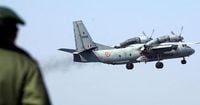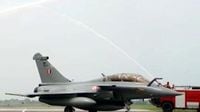The Indian Air Force (IAF) is set to conduct large-scale military drills along the International Border with Pakistan in Rajasthan, beginning Wednesday evening. The exercise, which has drawn attention due to recent tensions following a deadly terror attack in Pahalgam, is part of a pre-planned routine training initiative.
According to a Notice to Airmen (NOTAM) issued on Tuesday, May 6, 2025, the drills will commence at 9 PM on May 7 and conclude at 3 AM on May 9. During this period, flights operating from airports near the border will be suspended to ensure safety and the smooth execution of operations. The IAF has confirmed that all major frontline fighter jets will participate in the exercise, including Rafale jets, Mirage 2000s, Su-30s, along with tankers and AWACS.
Officials from the IAF emphasized that these drills will test the combat readiness of the crew, platforms, and systems in Rajasthan and surrounding areas. This exercise follows another significant air operation called Aakraman, conducted last month, which showcased the IAF’s operational capabilities through complex missions across the central sector.
The timing of these drills is particularly noteworthy, as they coincide with escalated military activities from Pakistan. Following the Pahalgam terror attack on April 22, which claimed 26 lives, Pakistan has engaged in its own military exercises. The Inter-Services Public Relations (ISPR) reported that Pakistan recently conducted a training launch of a FATAH-series surface-to-surface missile as part of its Exercise INDUS. This marked Pakistan's second missile test since the Pahalgam attack, with the first being a successful launch of the Abdali Weapon System.
The Pahalgam attack, attributed to The Resistance Front, a group believed to be linked to the banned Pakistani outfit Lashkar-e-Taiba, has led to significant diplomatic tensions. Indian authorities assert they have evidence of Pakistan's involvement in the planning and execution of the attack, prompting immediate retaliatory measures. India cancelled visas for Pakistani nationals and suspended the 1960 Indus Waters Treaty, a historic agreement governing water-sharing between the two nations.
In response to the heightened security situation, Prime Minister Narendra Modi has held multiple high-level meetings with military leaders, including National Security Advisor Ajit Doval and the chiefs of the Army, Navy, and Air Force. During these discussions, PM Modi granted the military complete operational freedom to respond to the Pahalgam incident, signaling a robust stance on national security.
These military drills are occurring simultaneously with nationwide civil defence exercises aimed at preparing the civilian population for potential military threats. Approximately 300 locations across India, including major cities like Delhi, are participating in these drills, which mark a significant increase in civil preparedness not witnessed since the 1971 war with Pakistan.
A civil defence district is designated as an area housing critical military assets or infrastructure, such as airports and oil refineries, which are considered high-value targets in the event of conflict. Training civilians on how to respond during such emergencies is deemed essential for national security.
In the backdrop of these military preparations, both India and Pakistan have ramped up their defense capabilities. Pakistan's recent missile test of the Fatah missile, which has a range of up to 120 kilometers, was described by local media as a validation of the weapon's design and performance. Meanwhile, India has also been actively testing its defense systems, including a new underwater mine equipped with advanced sensors.
PM Modi's strong rhetoric following the Pahalgam attack emphasizes his government's commitment to counter-terrorism. He has vowed to bring justice not only to the perpetrators of the attack but also to those who orchestrated it. "The evil agenda of terrorism can never win," he stated, reinforcing India's resolve to take decisive action against threats to national security.
As both nations navigate this precarious landscape, the international community watches closely. The recent suspension of the Indus Waters Treaty and the closing of border crossings further exacerbate the already strained relations between India and Pakistan. The situation remains fluid, with military drills and missile tests on both sides underscoring the urgent need for diplomatic engagement to prevent escalation.
In summary, the IAF's upcoming military drills represent a significant show of strength amid rising tensions with Pakistan, following the tragic events in Pahalgam. As both countries prepare for potential conflict, the implications of these exercises extend beyond military readiness, touching upon the broader geopolitical dynamics in the region.


